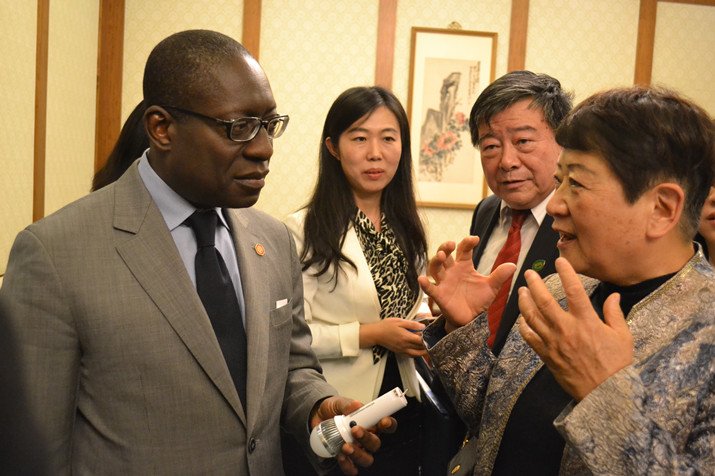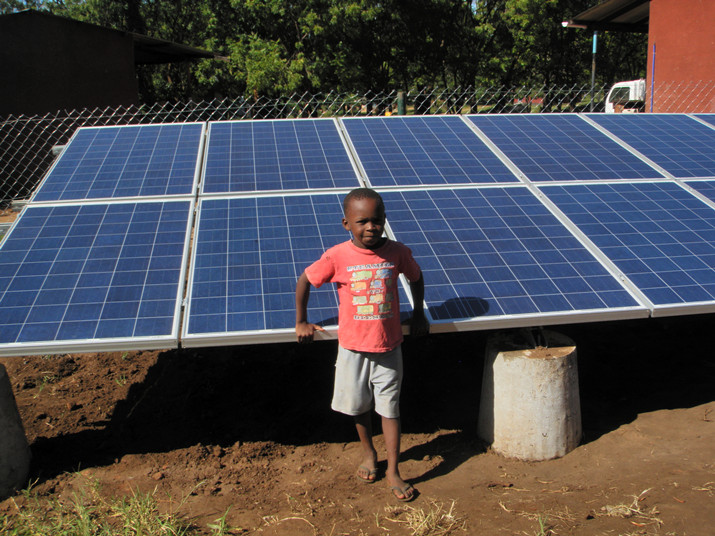|
||||||||||
| Home Nation World Business Opinion Lifestyle ChinAfrica Multimedia Columnists Documents Special Reports |
|
||||||||||
| Home Nation World Business Opinion Lifestyle ChinAfrica Multimedia Columnists Documents Special Reports |
| Business |
| Harnessing the Sun |
| Chinese solar power company provides clean, affordable and sustainable energy solutions in Africa |
| By Liu Jian | VOL. 8 December 2016 ·2016-12-28 |

Teng Aihua, General Manager of Poly Solar Technologies (right ) introduces mini solar power appliances to Paulo Gomes, special advisor to the Guinean President (left) (LIU JIAN)
In most areas in Africa, poor infrastructure and unreliable power supply means life-saving vaccines are often spoiled, as they need to keep cool from the point of manufacture all the way to the point of use.
Now, hope is at hand in the form of a solar-powered vaccine refrigerator that is expected to help address this major health challenge on the continent.
This innovative device was co-developed by Poly Solar Technologies (Beijing) Co. Ltd., a leading hi-tech Chinese company engaged in the renewable energy sector, and its strategic partner Haier Group, one of China’s largest home appliances and electronics makers.
“Driven by solar panels without any driving battery, this refrigerator does not need any power and fuel, and thus it’s environmentally friendly,” Teng Aihua, General Manager of Poly Solar told ChinAfrica.
This refrigerator is one of the renewable products and technologies Teng introduced to the international community when attending the Marrakech Climate Conference (COP22) held in Morocco this November.
The refrigerator’s inner temperature can be maintained at between 2 and 8 degrees Celsius for up to 119 hours in outside temperature of 32 degrees Celsius, providing a secure vaccine preservation solution, she said.
Like Poly Solar, over 100 Chinese companies have actively participated in the world climate change conference, introduced their renewable products and technologies, and engaged in climate dialogues with the international community to find potential cooperation opportunities. While seven years ago, only two Chinese entrepreneurs attended the COP15 in Copenhagen in 2009, said Chinese entrepreneur Wang Shi.
In recent years, China has strengthened efforts in combating pollution and protecting the environment, while Chinese firms have realized the importance of environmental protection. Thus they have been taking more initiatives in developing clean energy, engaging in solar, hydro, wind and geothermal energy projects, addressing climate change issues and improving their emissions performance.
Meeting African needs
Approved by the United Nations International Children’s Emergency Fund and World Health Organization (WHO), the solar-powered vaccine refrigerator can be used to store vaccines and drugs in hospitals and clinics lacking electricity.
In 2013, Poly Solar won the bid for the Ethiopian solar vaccine refrigerator project of the country’s Pharmaceuticals Fund and Supply Agency, and now 1,000 solar-powered vaccine refrigerators have been installed in 1,000 clinics in Ethiopia. Two years later, the WHO purchased 273 solar-powered vaccine refrigerators for use in the Democratic Republic of the Congo.
Over 600 million people in Sub-Saharan Africa - about two thirds of the population of the continent - live without grid electricity. Now thanks to companies such as Poly Solar, high-quality off-grid lighting and energy products are provided. For the huge off-grid population in Africa, especially in the remote rural areas, they provide a real and sustainable alternative.
“Those without electricity often use polluting and expensive lighting sources such as kerosene lamps or candles, the fumes of which can cause serious health problems,” said Teng. “Our target is to enable access to cleaner and safer off-grid lighting and energy for people in Africa.”
Established in 2007 as a subsidiary of Poly Technologies under the Poly Group, Poly Solar has been devoted to provide cost-effective designs, products, engineering construction and services in renewable energy projects such as solar power stations, solar home systems, solar photovoltaic lighting systems, solar vaccine refrigerators and solar photovoltaic pumping systems in 18 African countries.
Over the years, the company has actively participated in Chinese government assistance projects in Africa. It provided 600 sets of solar home systems for 400 villages in Sudan’s North Kordofan State in 2005-07, which have been used in schools, mosques, clinics and women’s activity centers.
In 2011, Poly Solar built three solar photovoltaic power stations, solar street lights and solar photovoltaic lighting systems for the African Union Conference Center in Addis Ababa, Ethiopia.
Two years later, the company undertook two solar photovoltaic station demonstration projects in Tanzania aided by the Chinese Government, which were highly praised by both the Tanzanian Government and the local communities.
In addition, it has also been participating in the African local projects initiated by the World Bank. For instance, it won the bidding for solar home system project in Ethiopia funded by the World Bank in 2012, and the company provided nine types of solar home systems, totaling 28,735 sets for rural families without electricity.
Apart from building big solar projects, the company has also developed various mini solar power appliances to meet local people’s needs, including solar electric fans, watches, torches and cookers, which are all portable, affordable and user-friendly, said Teng.

A young student poses for a picture standing near a10kw ground-mounted solar PV power station in rural Tanzania (COURTESY PHOTO)
Solar-powered solutions
Instead of only selling solar products in Africa, Teng hopes to build the company into a green, energy-saving and environment-friendly solution and services provider in the near future.
“For example, we can integrate our solar photovoltaic pumping system with drip irrigation systems, which delivers water directly to individual plants through a network of pipes and emitters, providing green agricultural solutions to Africa,” she explained.
In Teng’s eyes, solar energy has infinite possibilities. For instance, solar-powered water purification equipment can provide Africans with purified drinking water, while solar-powered home systems provide an energy-saving living solution.
Inside a solar-powered house, one can have the solar-powered refrigerator, air-conditioning, fan and water purification equipment. Those houses are earthquake resistant and termite-proof, and this type of construction can be used as clinics, schools or hospitals in Africa, said Teng.
“Solar is our core technology, and we hope to use it to build more projects vital to African people’s livelihood,” said Teng, adding that the company now cooperates with another company to build solar-powered waste treatment plants.
Quality first
Product quality should be the priority for Chinese companies entering the African market, as doing business in Africa is not a one-off deal, suggested Teng.
“After our products are sold and installed, maintenance and aftersales service become key to make them [the products] more durable,” Jiang Hao, Vice General Manager of Poly Solar, told ChinAfrica.
“When installing solar products in Ethiopia, we trained some of the staff members from our local logistic partner to install and maintain solar products, so that they now work as part of our aftersales service team,” said Jiang.
“We need to transfer our technology and skills to Africa, so that they can also make solar products on their own and create job opportunities for local people,” she added.
To ensure the quality of the products in the African market, she hopes the Chinese Government can establish relevant mechanisms to strictly control product quality, such as a testing and certification system. Teng believes these measures will help guide Chinese companies to compete in a healthy manner.
“To develop in a sustainable manner, my advice for Chinese companies is that it’s best if they can set up local promotion and repair centers, as well as train local people for installation and maintenance, making their products better received and meeting local people’s need in Africa,” she said.
|
||
| About Us | Contact Us | Advertise with Us | Subscribe |
| Copyright Beijing Review All rights reserved 京ICP备08005356号-5 京公网安备110102005860号 |